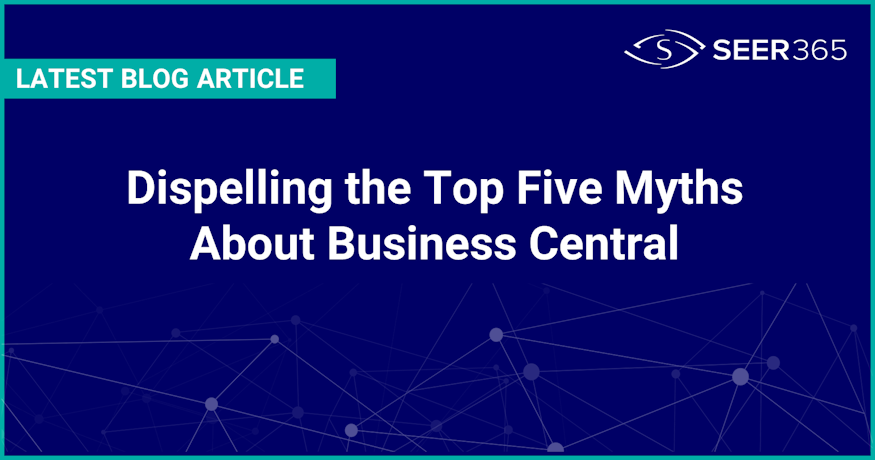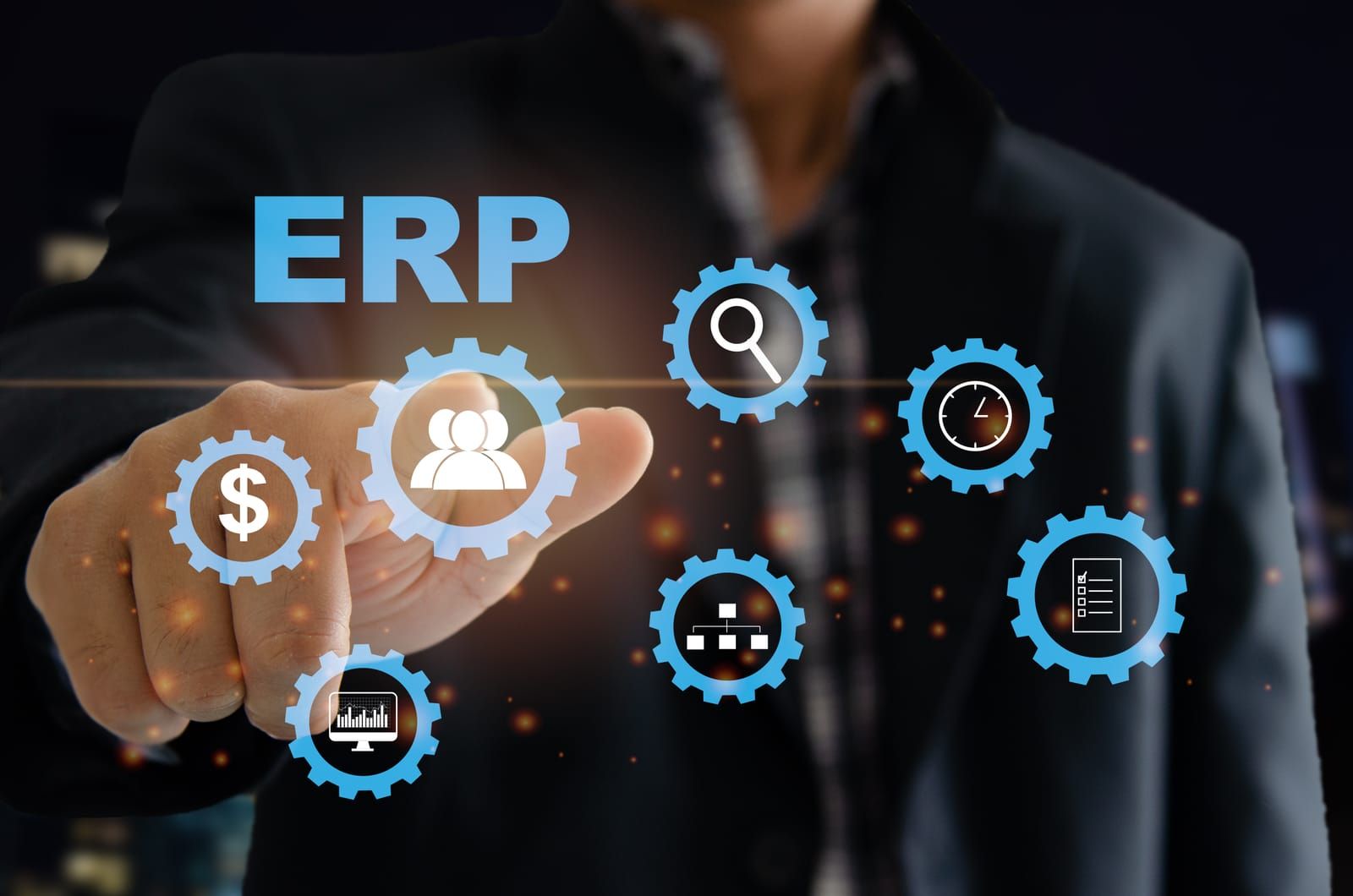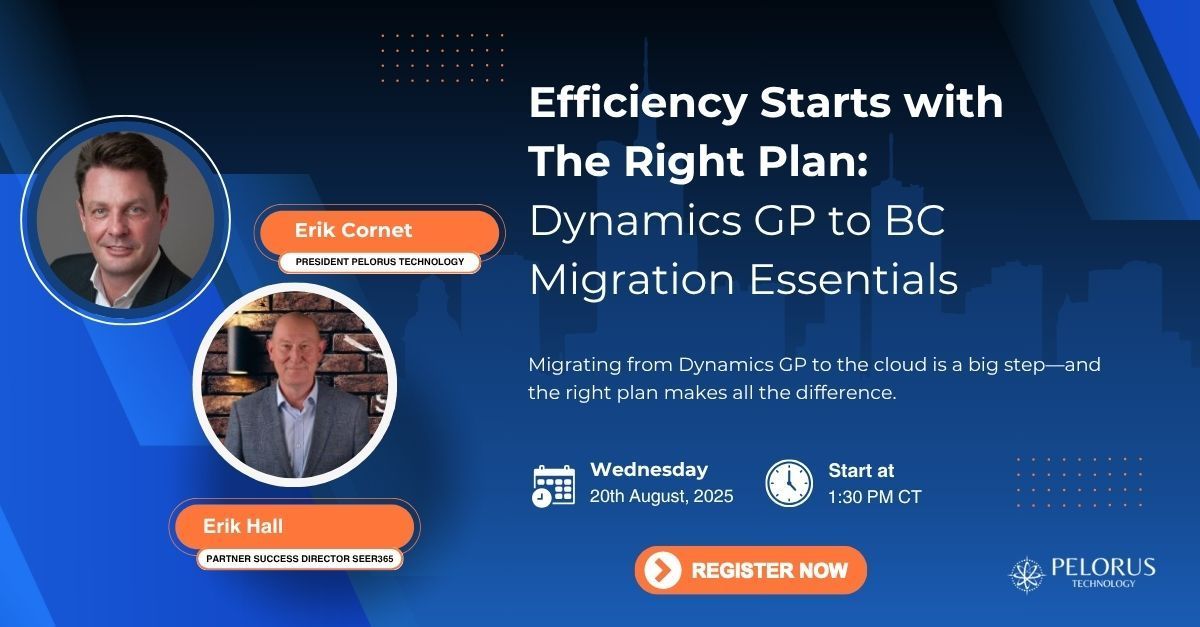Cloud ERP: Why Business Central Fuels SMB Growth

You can’t fully appreciate the value of cloud ERP until you’ve seen what companies are trying to live with instead.
A file server in the back closet.
A decades-old version of Microsoft Dynamics GP.
Spreadsheets and external systems Frankensteined into aging systems because the next upgrade never happened.
I’ve been there with clients, watching as these digital duct-tape jobs become their biggest barriers to growth. And by the time leadership is ready to move, the system is already holding them back.
Cloud ERP isn’t just a tech upgrade—it’s an escape hatch. With Dynamics 365 Business Central implementation, your ERP becomes a platform for growth, not a speed bump. You get scalability, real-time data, and the freedom to adapt—all without the infrastructure baggage.
What Are the Advantages of Using Business Central in the Cloud for SMBs?
Running a legacy ERP system like Dynamics GP might seem fine—until you hit a wall with customizations that won’t scale, integrations that break, and a lack of visibility across departments. Your teams shouldn’t be relying on siloed spreadsheets and manual workarounds just to keep the lights on.
And then there’s the end-of-life factor. Microsoft has officially announced that GP will end soon.
This timeline marks the clear end of life for Dynamics GP—a critical inflection point for businesses still relying on the platform. That means rising risks, higher support costs, and stalled innovation—the opposite of what growth-focused businesses need. (Microsoft GP Support Update)
What’s more, legacy systems are known for requiring expensive workarounds to stay compliant with changing regulations and security standards. As more integrations become cloud-first, older systems face issues connecting with essential tools, translating to more IT overhead and less agility across the business.
Can Business Central Support Rapid Growth in Midsized Companies?
Modern cloud ERP systems like Business Central are designed for agility. They scale as you grow—whether you’re expanding product lines, onboarding remote teams, or adding new locations. Imagine… budgeting for hardware upgrades or praying your VPN holds up become distant memories.
With native integration into the Microsoft 365 ecosystem (including Teams, Excel, Outlook, and Power BI), your people stay connected and informed. The user interface is clean, the updates are automatic, and the data is shared in real time. No more chasing numbers across systems or waiting for IT to work magic.
Suddenly, you have access to features that help your business operate more intelligently, like embedded analytics, AI-assisted workflows, and automated approvals. These aren’t just bells and whistles—they’re tools that help growing teams move faster and make smarter decisions.
Is Business Central a Good Fit for Startups or Growing Businesses?
Absolutely. Business Central is flexible enough to support businesses at various stages of growth.
For startups, it’s like a Swiss Army knife that covers your immediate needs without the bulk. For established businesses, it scales with you—capable of handling more complexity without requiring a custom-built solution.
The ability to start small and expand over time makes Business Central the smartest choice for organizations that want to grow without switching systems every few years. It adapts as your business model evolves.
Does Moving to Business Central in the Cloud Reduce IT Costs?
Cloud ERP is more than an operational win—it enables growth. With real-time data and automation at its core, Business Central helps reduce overhead, speed up decision-making, and open new revenue opportunities.
According to McKinsey, companies that embed digital technologies into their core systems grow revenue up to twice as fast as their peers and bring new products to market 50% faster. Such agility is unheard of with on-prem ERP.
Even small improvements in reporting and process automation can free up teams to focus on higher-value work. Instead of relying on outdated reports or manually duplicating data, finance and operations leaders can use that time to analyze trends, spot opportunities, and plan for the future.
And eliminating the need for on-site servers, maintenance contracts, and manual updates significantly reduces IT costs, especially for SMBs that don’t have large internal IT teams.
How Flexible Is Business Central for Adapting to Business Changes?
Business Central delivers all the benefits of cloud ERP, plus the familiarity of Microsoft. It supports evolving business models, integrates easily with other tools, and enables automation. Features like built-in AI (Copilot), role-based dashboards, and mobile access make it an ideal solution for growing SMBs.
It also delivers the peace of mind that comes with a cloud-native system: automatic backups, enterprise-grade security, and consistent product innovation from Microsoft.
The result? With fewer distractions, you have more time to focus on serving customers and scaling your business.
And with guidance from a trusted partner like Pelorus, you don’t have to figure it out on your own. We offer a fixed-cost migration path that removes surprises and gets you moving faster—with a system built to scale.
Overcoming Migration Roadblocks
If you’re worried about the jump from legacy ERP, you’re not alone. We hear concerns all the time: data migration sounds painful, everyone’s used to the old system, and NOBODY wants downtime.
Here’s some good news: migration is no longer a massive lift, especially with the right partner. At Pelorus, we take a clear, phased approach that reduces disruption and delivers value quickly and with a fixed price. If you’re curious what a successful transition looks like, ourBusiness Central Migration Guide breaks it down step by step.
For broader planning resources, Microsoft also offers aCloud ERP Migration Overview that walks you through common challenges and solutions.
With modern tooling, sandbox environments, and guided adoption programs, your business can migrate at its own pace—without grinding operations to a halt.
Don’t let legacy ERP challenges hold your business back. Microsoft Dynamics 365 Business Central offers the speed, flexibility, and insight you need to scale with confidence. And the sooner you start planning, the easier the transition will be.
Reach out to learn more about ourfixed-cost migration path that will eliminate surprises and help your business start growing faster—with the right foundation in place from day one.
Want to see how a well-structured migration plan actually works? Join us on Wednesday, August 20, for our free webinar: Efficiency Starts with the Right Plan: Dynamics GP to BC Migration Essentials.

About the Author
Erik Cornet is the founder of
Pelorus Technology and the creator of TiM (Time is Money), a time tracking solution built for professionals who are done with outdated timesheets.
With more than 25 years in ERP consulting, software implementation, and business systems strategy, Erik focuses on delivering structure, predictability, and meaningful results—especially for professional services and manufacturing teams. His approach emphasizes clear scope, disciplined delivery, and tools that make complex work simpler.
You can find Erik on LinkedIn to connect or learn more about his work.
Contact us today at Pelorus Technology to elevate your business operations with our expert Microsoft Dynamics 365 solutions and Services. As a Global Microsoft Partner, we are committed to streamlining your processes and delivering top-tier services tailored to your needs. Let’s get started on your transformation journey!










